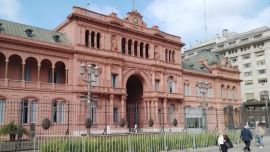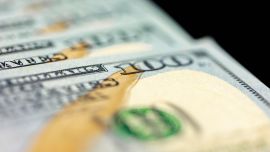VICENTIN NATIONALISATION
For the first time since quarantine began on March 20, coronavirus was dislodged from the main headlines of newspapers as from the start of the week when President Alberto Fernández announced that he would be imposing a trusteeship on the debt-laden Vicentin food conglomerate prior to its expropriation, in what many observers saw as a major advance on grain markets. Following protests at both the company’s Santa Fe plant and in the capital with saucepan-bashing, the government opened dialogue with Vicentin management and placed expropriation on the backburner but went ahead with the trusteeship under Gabriel Delgado of YPF Agro.
THE WEEK IN CORONAVIRUS
At press time yesterday there was a total of 28,764 confirmed cases of coronavirus and 785 deaths, as compared to 21,037 cases and 632 deaths the previous Friday. On Monday the Greater Buenos Aires shantytown of Villa Azul was reopened after being sealed off by police for a fortnight. On Wednesday President Alberto Fernández hinted that quarantine could go back to square one in the light of the daily influx of four-digit contagion figures, also expressing irritation over the number of nightly joggers in the Federal Capital. On Thursday the epicentre of the pandemic in Greater Buenos Aires moved to Tigre with almost 100 cases and yesterday a high-profile name was added to patients when Lomas de Zamora Peronist Mayor Martín Insaurralde tested positive for Covid-19.
MARKET WATCH
With debt talks apparently stretching into yet another week at press time yesterday despite the June 12 deadline set last week, both the parallel and official exchange rates inched downwards from the previous Friday, the “blue” dollar from 125 to 123 pesos and Banco Nación from 72 to 71.50 pesos, with no immediate fallout from the government’s controversial move on Vicentin food conglomerate. While a final definition of the government’s offer to creditors remains pending, country risk was fairly static – up fractionally to 2,574 points yesterday from 2,537 the previous Friday but down 1.3 percent from Thursday.
MALVINAS MARKINGS
The government will move to introduce new demarcation lines extending beyond 200 miles for its continental platform, which will include the Malvinas islands, long the subject of a sovereignty dispute with Britain, Foreign Minister Felipe Solá announced on Wednesday (which was also the Day of the Affirmation of Argentine Sovereignty over the islands). Two other bills presented seek to create a National Political Advisory Council on the Malvinas and stiffen the sanctions against those who fish illegally in Argentine waters.
SPYGATE
Vice-President Cristina Fernández de Kirchner went to Lomas de Zamora courthouse yesterday to testify against illegal espionage claims by AFI intelligence under the 2015-2019 Mauricio Macri presidency as one of a long list of politicians, journalists and others – a list too long for this space but even including key allies of Macri’s own administration such as City Mayor Horacio Rodríguez Larreta and former Buenos Aires Province governor María Eugenia Vidal.
LEGITIMATE JUSTICE?
The government yesterday named as its trustee for the Federal Penitentiary Service (SPF in its Spanish acronym) the ex-judge María Laura Garrigós de Rébori, founder of the Kirchnerite judicial grouping Justicia Legítima. The move comes at a critical time for the penal system during the coronavirus pandemic when the risks presented by overcrowded prisons led to mass releases which in turn prompted public unrest in late April and the resignation of the previous SPF director Emiliano Blanco a fortnight ago.
INFLATION AT 1.5% in MAY
Last month’s inflation was 1.5 percent, the lowest of the year so far, INDEC statistics bureau reported on Thursday evening, highlighting a sharp deceleration of food prices (at 0.7 percent half the overall average instead of double as in April). With a deep recession caused by the pandemic, public service pricing and the official exchange rate both frozen and no wage bargaining, everything favoured a low figure although market expectations were more in the region of 1.8 percent. Inflation so far this year is thus running at 11.1 percent and 43.4 percent over the last 12 months. The May figure would have been even lower without the “garments and footwear” item (up 7.5 percent) while education underwent -0.4 percent deflation.
RENT LAW
The Senate on Thursday approved the new rent law, which establishes a minimum contractual period of three years and an index-linking formula which factors in wage as well as price increases. The law also ratifies that all apartment expenses be met by the owner, not the tenant. The opposition walked out (metaphorically speaking, since it was a virtual session) to protest what it perceived as the government prioritising its own agenda over emergency legislation related to the coronavirus pandemic.
PICHETTO PROPOSED
The Juntos por el Cambio opposition has proposed Miguel Angel Pichetto, ex-president Mauricio Macri’s running-mate in last year’s election after being a three-term Peronist senator, to replace veteran Radical politician Jesús Rodríguez as Auditor-General, completing the latter’s four-year term. All wings of the opposition coalition agreed on this choice, which now awaits Congress approval.
APRIL IS THE CRUELLEST MONTH
Due to the coronavirus pandemic last April was the worst month in Argentine industrial history with 58 percent idle capacity (non-existent in the cases of the auto and tobacco sectors with not a single car coming off the assembly lines), INDEC statistics bureau announced on Wednesday, while Productive Development Minister Matías Kulfas had already anticipated a record low over a month ago. Industrial output was down 33.5 percent from the previous April. Stating the obvious, INDEC pinpointed quarantine as the main cause of the collapse, concluding that only a third of manufacturing industry had been able to operate normally in April. Only four sectors – chemicals (69.3 percent), paper and cardboard (59.9 percent), food and beverages (59.9 percent) and printing (57.6 percent) – operated at over half their capacity while oil refining (46.2 percent) was just below.

















Comments